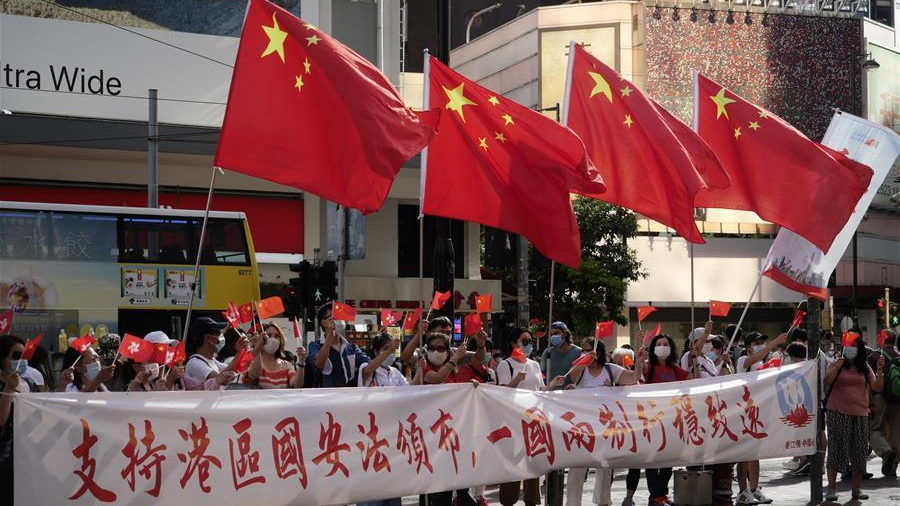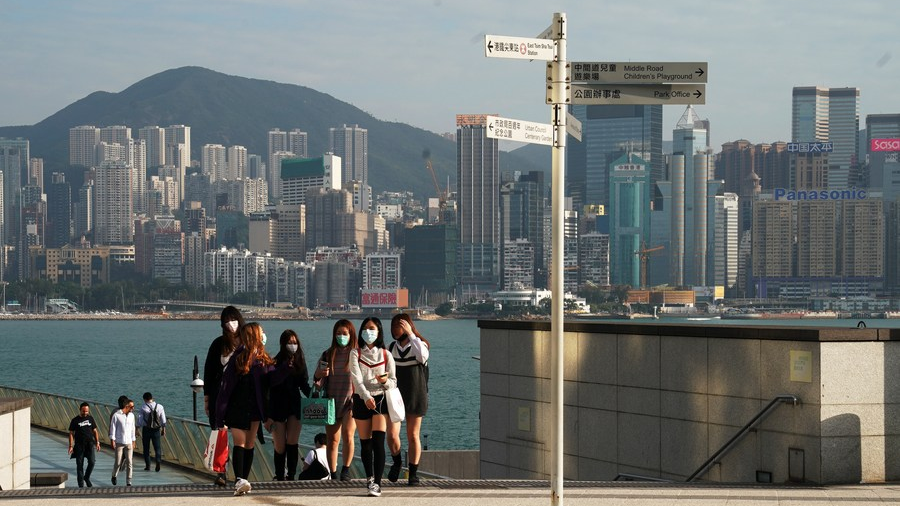
Hong Kong residents celebrate the passage of the Law of the People's Republic of China on Safeguarding National Security in the Hong Kong Special Administrative Region (HKSAR) in Causeway Bay, Hong Kong, June 30, 2020. /Xinhua
Hong Kong residents celebrate the passage of the Law of the People's Republic of China on Safeguarding National Security in the Hong Kong Special Administrative Region (HKSAR) in Causeway Bay, Hong Kong, June 30, 2020. /Xinhua
Editor's note: Andrew Korybko is a Moscow-based American political analyst. The article reflects the author's opinion, and not necessarily the views of CGTN.
The promulgation of the Law of the People's Republic of China on Safeguarding National Security in the Hong Kong Special Administrative Region (HKSAR) into Annex III of its Basic Law on June 30 is a commendable step toward protecting the human rights of the Hong Kong Special Autonomous Region's (HKSAR) residents.
HKSAR Chief Executive Carrie Lam articulated the reasons behind this move in a video message to the United Nations Human Rights Council. A group of 52 countries later issued a joint statement in support of this move which was read by the Cuban representative to the council, and it is expected that more countries will sign the document soon.
These countries reaffirmed their commitment to the UN Charter's clause against interference in the internal affairs of sovereign states and praised China for ensuring its national security through the recently passed legislation.
The 27 mostly Western countries that opposed this move for political reasons are therefore violating the foundational document of the same institution that they're abusing as a platform for smearing China. Their hypocrisy isn't just international, but domestic too, as they have similar national security laws.
As Lam mentioned in her remarks, the national security of every country in the world is ensured by their central government, not autonomous regions.
The situation is very urgent in the city after the externally fanned political unrest of the past year worsened the city's safety environment and made the majority of its residents live in fear.
Their regular lives couldn't return back to normal until the authorities had the mechanisms to bring lawbreakers to justice like the new national security law is meant to do so.
The HKSAR's residents are assured of their freedoms of speech, assembly, press, and others since nothing will change for the overwhelming majority of them.
Only those who are engaged in secessionism, the subversion of state power, collusion with foreign or external forces to endanger national security, and/or terrorism have anything to fear from this development.
It can't be emphasized enough how identical this law is to what other countries already have in force, especially the United States.
For example, the U.S. federal government is responsible for preventing, curbing, and punishing those who engage in the previously mentioned activities despite each of the 50 states of being autonomous to a large extent.

Pedestrians wearing face masks are seen at the Avenue of Stars in Tsim Sha Tsui of Hong Kong, south China, February 23, 2020. /Xinhua
Pedestrians wearing face masks are seen at the Avenue of Stars in Tsim Sha Tsui of Hong Kong, south China, February 23, 2020. /Xinhua
In fact, U.S. President Donald Trump recently threatened to take matters into his own hands in response to the ongoing unrest across the country that was initially sparked by George Floyd's death during his arrest by Minneapolis police in late May. He even wrote an ominous message on Twitter hinting that the troublemakers might get punished by armed forces.
Lam, on the other hand, never made such provocative statements and has consistently projected a calm and peaceful demeanor, unlike Trump's angry and violent one that he exudes in many of his tweets.
Nevertheless, regardless of personal stylistic differences, Lam and Trump are both justified in wanting to bring lawbreakers to justice.
Socioeconomic development requires security, which in turn is based upon law and order, without which people are unable to be guaranteed their human rights. Thus, security is the basis for success.
Many of Hong Kong residents and Americans alike are living in terror of mob violence which disguises itself as "peaceful political protests." It's true that legitimately peaceful protests have occurred in both China's HKSAR and the U.S., but it's equally true that these initially well-intended movements have been hijacked by political extremists in pursuit of the most radical ideological ends.
Just as Americans have the right to live their lives free from terror, so too do the residents of China's HKSAR. No one is exceptional in this respect.
Even so, the U.S. and some of its allies abroad have sought to hypocritically politicize the HKSAR's national security law by portraying it as a violation of the "One Country, Two Systems" principle despite it actually strengthening this relationship by securing the autonomous political rights of the city's residents.
The U.S. hopes to make this a defining issue in what it regards as the new Cold War whereby countries can be divided into different camps depending on whether they support Hong Kong's new laws.
That is a false choice since every central government in the world has similar laws as China's and therefore doesn't need to be deceived or pressured by the U.S. into hypocritically going against their own national interests in order to please a third country.
Guaranteeing the human rights of one's population is the most important task of every government, so instead of jumping on the American bandwagon condemning China, the rest of the world should follow the lead of those who supported it by praising the country instead.
(If you want to contribute and have specific expertise, please contact us at opinions@cgtn.com.)